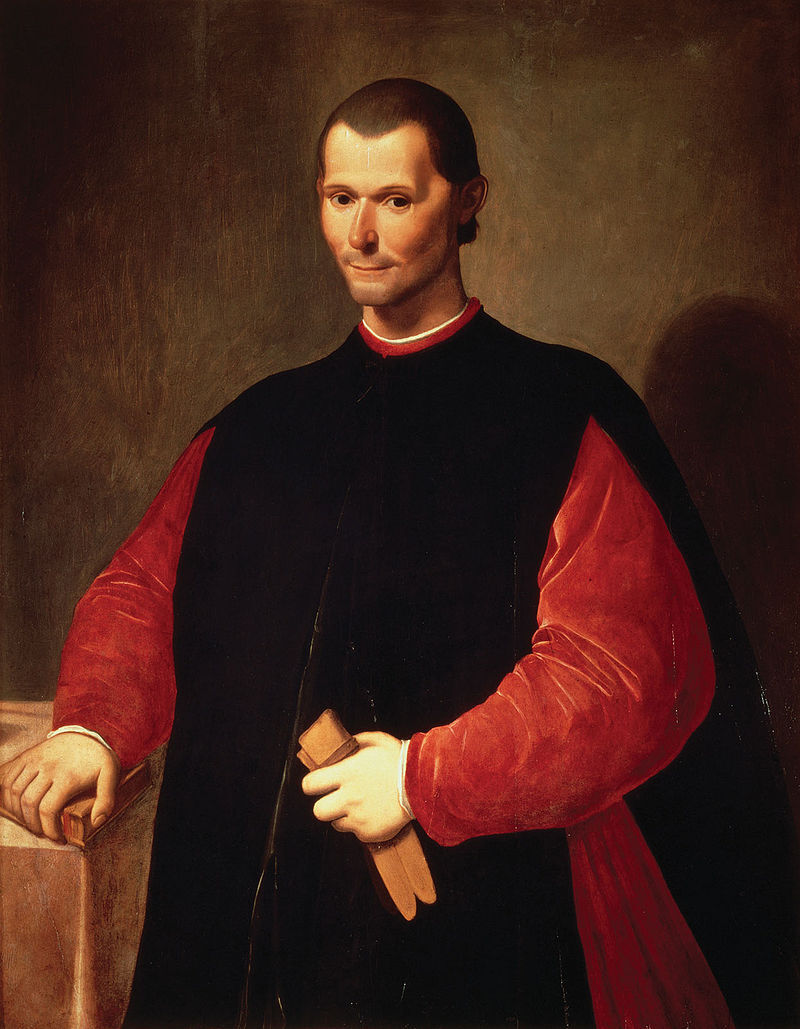The concepts covered in this fact sheet go beyond those seen in high school. It is intended as a supplement for those who are curious to learn more.
Machiavelli (1469-1527) was an Italian humanist author. His political ideas laid the foundations of modern politics. Machiavelli's ideas still influence politicians and political analysts today.

Machiavel
For many, Machiavelli is associated with dictators. Yet a closer look at the author's ideas reveals them to be thoughtful, far from simplistic and reductive. Machiavelli held an important position in the management of the powerful city of Florence. This job took him on several diplomatic missions in which he was able to analyze power and its many aspects. Following various conflicts, he went into exile. It was during this exile that he wrote The Prince, which quickly became a major work. After several returns to politics, he wrote further texts in which he refined his ideas.
As a humanist, Machiavelli was strongly influenced by the political writings of Aristotle, Cicero and other medieval texts. At the time he lived and wrote, Italy was divided by several internal conflicts. Italy had to contend with France and Spain and their ambitions for conquest. This particular context led Machiavelli to develop his conception of politics and his vision of the state.
All Machiavelli's writings aim to provide a true description of the exercise of political power and the actions of government. According to him, only the sovereign, whom he calls the prince, has and exercises real power. Man is generally powerless in the face of circumstances, unless he acts at the right time and in the right way. Initiative is an essential quality in a good ruler.
In addition to initiative, the good ruler must also master virtù, a notion not to be confused with the word virtue. Virtù is in fact an amalgam of energy in the conception of plans, speed in their execution, resolution, cunning and political genius. Virtù is the art of choosing the right means to dominate, depending on the circumstances.
According to Machiavelli, reason of state takes precedence over everything else. It must lead to the betterment of man and society. It may be appropriate to use force and cunning when laws are insufficient. For the same reasons, the sovereign may react against humanity, charity and religion.
Moreover, it is not necessary for the sovereign to master all qualities. It is necessary, however, for him to appear to have mastered them. The prince's aim is to conquer power, keep it and stay alive.
Many of the ideas put forward in this essay still influence today's politicians.
When a ruler acts in accordance with religious principles, the result is always failure. This is why Machiavelli advises the use of force to conquer. You can't win by using evangelical gentleness. On the other hand, religion can help the state to function properly, insofar as the prince uses religion without being controlled by it.
Moreover, according to Machiavelli, the Church was largely responsible for Italy's internal division. Moreover, the reunification of Italy was Machiavelli's ultimate goal. Only reunification could enable Italians to rid the country of foreign invasions.
Machiavelli's essay is in fact the first text in which the word State is used in the modern sense: a framework for the exercise of power. There are two types of power: the republic and the principality.
According to Machiavelli, the principality represents the best type of power management. He also distinguishes two types: the hierarchical principality (of no interest to Machiavelli) and the new principality (not based on the heredity of power).
The new principality, however, represents a certain danger of instability, since the commoners or the people will always expect a new ruler to be necessarily better than the previous one. As a result, contenders for the post of prince must use their strength and luck to gain power. No matter who wins, a prince must never allow disorder to invade his society, in order to avoid war.
Machiavelli was a republican by conviction. For him, the republic was the political ideal. However, it cannot be applied everywhere. Honesty and equality among citizens are essential. In states where corruption reigns, there is a need for a tyrant. For Machiavelli, a principality is the ideal place to found a state, and a republic to maintain it.
The main aim of a prince is, of course, to acquire power, but above all to retain it. The prince must have the qualities and strengths of a great man: the ability to master foreign powers as well as his own subjects, talent, merit, courage, wisdom, and so on. The prince generally sticks to what is good, even if he does not hesitate to resort to evil if he deems it necessary in the circumstances. A good prince also establishes a lasting social and international order. To achieve this, the sovereign must master the art of war, cunning and propaganda.
Machiavelli left such an indelible mark on modern politics and history that we even use an adjective derived from his name. Machiavellianism applies to a pragmatic, utilitarian vision of politics: reason of state. In this perception, the end (the general good) justifies the means. Government is detached from morality and religion. It can also resort to lies and force if it deems it necessary.
Today, Machiavellianism is generally associated with dictators, the thirst for power, and even evil. How we view Machiavelli's ideas depends on our point of view. Indeed, at one time, some people used Machiavelli's ideas to argue that communism was the modern form of the Prince.